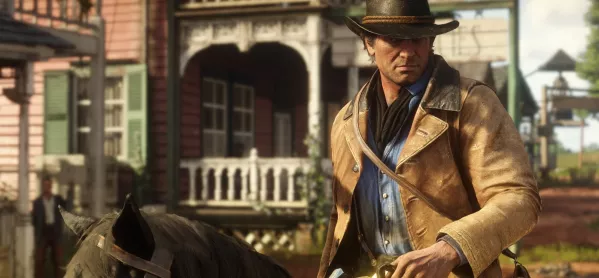- Home
- Teaching GCSE English with Red Dead Redemption 2
Teaching GCSE English with Red Dead Redemption 2

When the Western-themed video game Red Dead Redemption 2 launched last month, it achieved the highest-grossing opening weekend of any entertainment product ever.
It comes from the same publisher as the notorious but enormously successful Grand Theft Auto series, so it benefitted from huge investment and a vast, expectant fan base.
Those of us who teach GCSE English resits know the value of lassoing student crazes as they gallop by, and jumping on for the ride.
As a Western fan myself, who as a teenager watched the brat-packed Bon Jovi sound-tracked Young Guns movies far too many times, I didn’t need much of an excuse.
The Marmite-genre
But I was conscious that Westerns can be something of a Marmite-genre and I said as much to my students.
“I like it,” said one learner.
“The Western genre?” I clarified.
“No,” she said. “Marmite.”
I’d been surprised by the runaway success of Red Dead Redemption 2 because I did not imagine it would have the universal appeal that might come with a genre such as horror.
A stark gender divide
What became clear very quickly once I began discussing it with students was a stark gender divide: Only a tiny number of girls indicated that they enjoyed Westerns. It’s not surprising when you look at the game, as it exemplifies the problems of the genre.
The protagonist, Arthur, is male – and women in the game mostly fill the expected, disempowering archetypes. Having admittedly only made it a third of the way through the game myself so far, I’ve encountered just two strong, female characters. Their roles were minor and in both cases defined by ultimately needing to be rescued by Arthur.
It’s been widely reported that the inherent freedom of the game’s design has permitted basement-dwellers the world over to get their kicks by murdering suffragettes.
At least it can be argued that wasn’t an explicit intention of the developers. What’s more damning, in my view, is that the role of the suffragettes in one of the game’s narrative missions is as a vulnerable target that again needs a man’s protection. As if they were sheep in need of a shepherd.
Challenging expectations
In the classroom, loudly playing the trailer to Netflix’s western series Godless helps bring a little balance.
Merritt Wever’s kick-ass character Mary declaring “We’re a lot fucking stronger than you think we are” and pumping a shotgun, over the powerful vocals of Nico Vega’s Bang Bang, quickly gets the girls’ attention, while the boys start to look a little scared.
There are strong, female role models in the genre. This year is the fiftieth anniversary of the novel True Grit, providing plenty of scope for use in the classroom and plenty of debate in the staffroom over which film adaptation is the better.
The story of a 14-year-old girl hunting down her father’s killer while continually outwitting the adult males around her is effective precisely because it challenges expectations. Charles Portis’ portrayal of Mattie half a century ago has such strength and resolve it leaves the Katnisses and Bellas of decades later, still in thrall to disappointing boys, looking rather uninspiring.
Enormous freedom of the new English language course
However, I wonder if Mattie’s intended audience is really adults who will likely find amusing irony in her highly-articulate speech that’s half preacher and half lawyer, contrasted against the untamed roughness that surrounds her.
For students, it can be a barrier to relatability and it can rob moments that should be rollicking good fun – such as when she shoots an outlaw in the belly – of their potential energy.
My resit students much preferred an extract from Stephen King’s sort-of-western, Wizard and Glass. But there we’re back to women as witches at worst and sacrifices on the altar of male character development at best.
What all of this does highlight though is the enormous freedom of the 9-1 English language specification.
'I never want to return to that'
We can expose students to a wide range of fun, exciting, and stimulating texts. We can capitalise on cultural trends as they emerge or we can set out to challenge preconceptions and explore pretty much any issue under the sun.
It wasn’t too long ago that we English teachers would be grabbing piles of leaflets or flyers from doctors’ surgeries and tourist-information booths, to fulfil the mind-numbing requirements of the old GCSE, making English as hard to enjoy as possible. I never want to return to that.
Despite its flaws, there’s something about Red Dead Redemption 2 that speaks to me as an English-resit teacher.
In 1899, the Old West is disappearing and Arthur Morgan is continually on the run, trying to stay a step ahead of the Pinkerton Detective Agency, whose wealthy paymasters want to eradicate his type from the modern world.
'Keep the creativity and joy in English'
Like Morgan’s gang, there are those of us who want to keep the wild freedom alive as long as possible.
We’ll keep moving, looking for any last unexploited means to keep the creativity and joy in English in the face of the industrialists’ clamour for functionalism.
We’ll keep shooting down the cynical arguments massing against us. Come join us for the ride. Bang, bang!
Andrew Otty leads 16-19 English in an FE college. He is an ambassador for education charity Shine
Keep reading for just £1 per month
You've reached your limit of free articles this month. Subscribe for £1 per month for three months and get:
- Unlimited access to all Tes magazine content
- Exclusive subscriber-only stories
- Award-winning email newsletters



